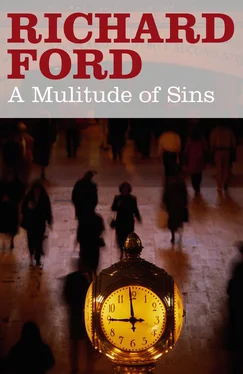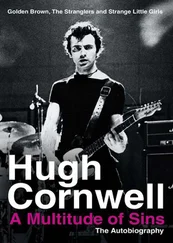“Is that all?” Wales said.
“Yes.” She looked at him and blinked.
“It doesn’t seem very important,” he said.
“It’s just why they were unsuccessful human beings,” Jena said calmly. “That’s all.”
“But does it mean very much to you?” It surprised him that this was what she wanted to talk about. It seemed so intimate and so irrelevant.
“They’re my parents,” she said.
“Do they like you?”
“Of course. I’m rich. They treat me like royalty. It’s why I’m a painter,” Jena said. “They didn’t honor their duty to order the world in a responsible way. So I have to say things with my painting, because they didn’t.”
Perhaps all the time spent with children, he thought, making nothing into something, distorted your view. “But does it bother you,” he asked.
“No,” Jena said. “I’d like to put them in a novel, too. Do you think they would be believable in a novel?” She hoped to write a novel. She liked all media.
“I’m sure they would,” he said. And he thought: how difficult could it be to write a novel? So many did it. He liked novels because they dealt with the incommensurable, with the things that couldn’t be expressed any other way. What he did was so much the opposite. He dealt with things that happened. The wrapping of the Reichstag. The funeral of a phony princess. Failed actualities, with his reactions to make up for the failure.
Someone knocked loudly on the door at the end of the short, dark hallway, and then opened it. He’d forgotten to turn the lock.
“Housekee- ping ?” a young woman’s bright voice spoke. A bar of yellow light entered the room from the corridor outside.
“No!” Jena said loudly, her face, so close to his, startled, sharply unpretty. Her mouth could look surprisingly cruel, though she wasn’t especially cruel that he had seen. “ No housekeeping.”
“Housekee- ping ?” the voice said again, happily. “Would you like to be your bed turned down?”
“No!” Jena shouted. “ Not . No bed turned down.”
“Okay. Thank you.” The door clicked closed.
Jena sat for a moment in her chair, in the candlelight, as if she was very displeased. Her hands were clasped, her mouth tightly shut. He could sense her heart beating stern, insistent beats. He’d thought, naturally enough, that it was her husband. She must’ve thought so. And sometime, of course, it would be, long after it mattered. “Would you like to be your bed turned down?” she said ruefully.
He looked around the darkened room. A tall wood-and-brass clock with a motionless brass pendulum stood in the shadows against the wall. There was a pretty decorative fireplace and a mantel. There was a print in a gold frame. Caravaggio. The Calling of St. Michael . He’d seen it in the Louvre. A glass of wine would be nice now, he thought. He looked around for a bottle on a table surface, but saw none. Jena’s clothes were all put away, as though she’d lived here for months, which was how she liked things: ordered surfaces, an aura of permanence, as if everything, including herself, had a long history. It was her form of kindness: to make things appear solid, reliable.
“Have you ever killed anyone?” she said.
“No,” Wales said. She liked to think of him not as a journalist but as a spy. It was her way to make him opaque, to keep herself off-balance. She had asked very little about what he did. At first, when they’d gone for a drink, she’d been interested. But after that she wasn’t.
“Would you?”
“No,” Wales said. “Do you have someone in mind?” He realized he still had on his coat and tie.
“No,” Jena said and smiled and widened her eyes, as if it was a joke.
He thought for the second time in an hour about the woman’s death he’d witnessed on Ardmore Avenue, about the progress of those events to their end. So much possibility, so much chance for a better outcome had been caught in that slow motion. It should make one able to see the ends of events before they happened, to forestall bad outcomes. It could be applied to love affairs.
“That’s surprising,” Jena said. “But it’s because you’re a journalist. If you were a real writer you’d be different.”
She smiled at him again, and he caught the tiny faraway feeling that he could love her, could enter the mystery that way, though the opportunity would pass soon. But her willingness to say the wrong thing, to boast — he liked it. She wasn’t jaded by experience, but freed by a lack of it.
“What do you do in Europe?” she said.
“I go see things and then write about them. That’s all.”
“Are you famous?”
“Journalists don’t get famous,” he said. “We make other people famous.” She didn’t know anything about journalists. He liked that, too.
“Someday you’ll have to tell me what’s the strangest thing you ever saw and then wrote about. I’d like to know about that.”
“Someday I will,” Wales said. “I promise.”
Making love was eventful. At first she was almost dalliant, though selective, vaguely theatrical, practiced. And then after time — though all at once, really — engrossed, specific, unstinting, exactly as if it was all unscripted, all new ground, whatever they did. She could find the new with great naturalness, and he was moved by the sensation that something new could occur with someone: that self-awareness could take you on to immersion and then continue for a long while. He resisted nothing, abjured nothing, never lost touch with her in all of it. It was what he wanted.
And when it was over he was for a long time lost from words. She had turned on the lamp by the bed and slept with her hand covering her eyes. And he’d thought: where had this gone in my life? How would I keep this? And then: you don’t. This doesn’t keep. You take it when it’s given.
The clock beneath the lamp said 9:19. Wales could smell the solvent and the hyacinths on her painter’s table, sharp, murky aromas afloat in the warm room. Outside, voices spoke in the hall. Twice the phone rang. He showered, then walked to the window while she slept, and looked at the painted photograph, the two people, their smiling midwestern features distorted. She must hate them. Then he remembered the Bacons in the Tate. The apes in agony.
What he wanted to think about then was the funeral day in London. It was a relief to think about it. The balmy Saturday with summer lasting on. He’d taken the train from some friends’ outside of Oxford. The station — Paddington— had been empty, its long, echoing platforms hushed in the watery light, the streets outside the same. Though the tabloids had their tombstone headlines up. WE MOURN! WE GRIEVE! THEY WEEP! GOODBYE .
At the Russell Hotel, he’d stayed in and watched it all on TV. It was an event for TV anyway — his reactions were the story. Passing on the screen were the cortège, the acre of memorials, the soldiers, the bier, the Queen, the Prince. The awful brother. The boys with their perfect large teeth and the whites of their eyes too white. Through the open window, in with a breeze, he’d heard someone say — a woman, possibly in the next room, watching it all just as he was—“This’ll never happen again, will it?” she’d said. “Ya can’t say that about much, can ya? Completely unique, ya know? Well, not her, of course. She wasn’t unique. She was a whoor. Well, sure, maybe not a whoor. But you know.”
In America it was five a.m. He wondered if anyone would be up watching.
And to all of it his reactions were: How strange to have a royal family. She was never a beauty. What did it all cost? Death by automobile is always slightly trivial. People applauded the hearse. What does one write in a condolence book? It’s really themselves they’re pitying. How will they feel in a month? In a year? We magnify everything to learn if we’re right. Someone —and this is what he wrote finally, the crux of it, the literature of the failed actuality— someone has to tell us what’s important, because we no longer know .
Читать дальше












